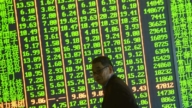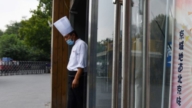【新唐人2013年07月20日訊】17號,國際貨幣基金組織(International Monetary Fund,簡稱IMF)表示,如果中國不能兌現經濟改革承諾,到2018年,中國經濟增長率可能下降到4%左右。此前IMF對中國今年的GDP評估,已由4月的8%降到7.75%。專家指出,因為在中共虛假數據維持下的「假繁榮」已經浮出水面,國際組織逐漸清醒了。
週三,國際貨幣基金組織(IMF)撰文警告說,留給中共領導人的時間已經不多,中共要想獲得成功,必須果斷加快經濟改革,否則,到2018年,中國經濟增長率可能下降到4%左右。
美國南卡羅萊納大學艾肯商學院教授謝田:「現在中國經濟衰退的趨勢讓國際社會 國際金融機構現在開始清醒了起來,不像原來那樣頭腦發熱,一廂情願的相信中共的欺騙宣傳,認為中國在改善,多少多少年要超過美國,但實際上,真正降到4%的話,在扣除中共官員浮誇造假的因素,中國經濟肯定處在負的衰退的區間之內。」
台灣大學經濟系教授張清溪:「中國的經濟成長率到底是多少,我覺得沒有多大意義,因為它是真的、假的也不知道。它的投資其實就是蓋了一些像鬼城,一些不需要的東西。還有一些它的投資造成產能過剩,其實都造成問題,它的問題是越來越多,越來越明顯,表面化,很多國際組織都可以看得出來了。」
IMF 提出的建議包括:實施金融系統改革,讓市場力量而非行政力量發揮更大作用﹔讓國有企業上繳更多紅利﹔更多的通過累進所得稅而非社會保障繳費來提高財政收入等等。
中國經濟體制改革研究會特聘研究員毛壽龍:「從制度上來講,它如果能夠給個人提供更多的積極向上的空間,給其他人提供能夠寧靜生活,這樣的一些制度性的的空間,那麼對這個社會來講,比較成熟。」
中國經濟體制改革研究會特聘研究員毛壽龍向《新唐人》表示,中共目前還沒有找到好的辦法。
毛壽龍:「很多人都在說中國如果沒有政治體制改革,經濟體制改革很難成功,但也有人認為沒有經濟體制改革的話,經濟體制改革有可能會進入北非的那種情況,或者不穩定的政治發展階段。是不是有一種可循的道路,避免社會動盪的情況下,能夠更好的實現政治方面的發展,這方面還沒有很好的成熟的思路。」
目前,拉動中國經濟的三駕馬車——投資、消費、出口全面趴下。面對中國的經濟困境,各路經濟學家普遍悲觀。
美國摩根大通企業及投資銀行中國市場主席李晶在7月15號的記者會上指出,中國的經濟矛盾堆積如山,經濟將停滯不前。
北京當局,近期希望擺脫以挹注資金來拉動經濟增長的模式。不過根據中國前三個月的數據顯示,投資仍是中國經濟擴張的最大驅動因素。如果停止地方政府及國企大量投資房地產及道路建設,中國的經濟增長可能戛然而止。
「海通國際證券集團」公司首席經濟學家胡一帆認為,如果沒有政策推動,不但經濟復甦很難,反而會進一步下滑,經濟改革的成本和難度將不斷加大。
不過,「匯豐銀行」亞洲區董事總經理屈宏斌則表示,中共當局不會容忍經濟迅速減速,總理李克強將對公共住宅等增加支出。
謝田:「這個能不能做成很值得懷疑的,以前也搞過經濟適用房,最後這些房源也通過權力交換的關係被貪官拿走,建成的的公共住宅會不會同樣被貪腐官員拿走呢?在中共的絕對權力沒有法律保障的情況下,誰能保證不成為另一批官員致富的另一個發源地?即使它想進行這種公共住宅的支出,這些錢從哪裏來,中國的國有銀行都在鬧錢荒。」
台灣大學經濟系教授張清溪指出,中共當局在經濟上的困境到了無解的境地。因為共產黨依靠控制經濟來維持統治,甚至包庇地方政府貪污腐化來維持穩定,如果進行經濟改革,中共將面臨解體,不改革同樣會亡國。
採訪編輯/劉惠 後製/蕭宇
IMF: China’s Growth May Fall To 4% Without Reform
On July 17, the International Monetary Fund (IMF) warned
that if China doesn’t fulfill promises of economic reform,
their economic growth will likely fall to 4% in 2018.
The IMF’s latest assessment for China’s GDP growth
has dropped from 8% in April to the current 7.75%.
Experts say that now the Chinese Communist Party’s (CCP)
fabricated data and it’s flourishing appearance have been seen
through, gradually allowing the IMF to see it clearly.
The IMF’s latest report warns CCP leaders that
“time is running out on the current model”.
To be successful, China must decisively accelerate economic
reforms, or else, its economic growth may drop to 4% in 2018.
Xie Tian, Professor at the School of Business, University
of South Carolina Aiken: “Now China’s economic recession
trends have made international financial institutions wake up.
They no longer believe, as they used to, the CCP’s propaganda
about how it’s improving or will exceed the US in a few years.
Actually, if the growth really drops to 4%,
apart from the data fabricated by corrupt officials,
China’s economic growth may fall into the negative range.”
Zhang Qingxi, professor in economics at National Taiwan
University: “I think China’s economic growth data is meaningless,
as we don’t know if it’s true or false.
They invest in property to build ghost cities, such useless things.
There’s also the issue of their exceeding production capacity.
As the CCP’s problems become more numerous and obvious,
with many now floating to the surface, many international
organizations and foreign companies are able to recognize them.”
IMF suggests that China revamp the financial system to give
a greater role to market forces rather than administrative orders;
increase dividends paid by state-owned enterprises;
and increase revenue via progressive income taxes,
rather than social security contributions; among other suggestions.
Mao Shoulong, research fellow at China Society of
Economic Reform: “In terms of it’s system,
if the CCP can provide more freedom for individuals,
relatively speaking, it will lead to a mature direction.”
Mao Shoulong told NTD that the CCP hasn’t yet found
a good solution.
Mao Shoulong: “Many people say that without political reform,
the economic reform will not be successful.
Other people say that without economic reform, the political
system will become like the situation in North Africa,
or a stage of political instability.
Whether there is a solution to avoid social unrest,
without affecting the economic development,
there is no mature solution yet.”
At present, investment, consumption and exports are all falling.
Many economists feel pessimistic regarding
China’s economic difficulties.
On July 15, Jing Ulrich, director and chairman of China
Equities and commodities at J.P. Morgan’s Chinese market
said at a press conference that China’s economic disputes
are piling up, and will stagnate.
Beijing authorities hope to avoid injecting funding and
pulling the economic growth.
The last 3 months’ official data shows that investment is
still a big factor driving the expansion China’s economy.
If local government and state-owned companies
stop investment in real estate and road construction,
China’s economic growth likely will stop instantly.
Hu Yifan, Chief Economist at Haitong Securities Co. says
that without a push from policies, not only is economic
recovery difficult, but it also will decline further.
The cost of economic reform will constantly increase.
Qu Hongbin, HSBC’s Chief Economist for China says that
Beijing won’t tolerate the economic slowdown immediately,
Premier Li Keqiang will increase expenses
on state-owned housing.
Xie Tian: “I doubt whether it can be done or not.
In the past, they built some affordable houses, but
they were later seized by corrupt officials.
After state-owned houses are built up,
will they again be occupied by corrupt officials?
The CCP doesn’t have a power restriction system,
no one can promise officials won’t get rich from it.
Although the CCP intends to invest on affordable houses,
where will the money come from?
Banks all over China are short of money.”
Zhang Qingxi says China’s economy has run into a dead end.
As the CCP relies on the control of economy
to maintain its power.
Even covering up the corruption of it’s local governments
to obtain its “stability”.
Implementing economic reform is the CCP’s collapse,
and without carrying out economic reform,
the entire nation of China will collapse.




























